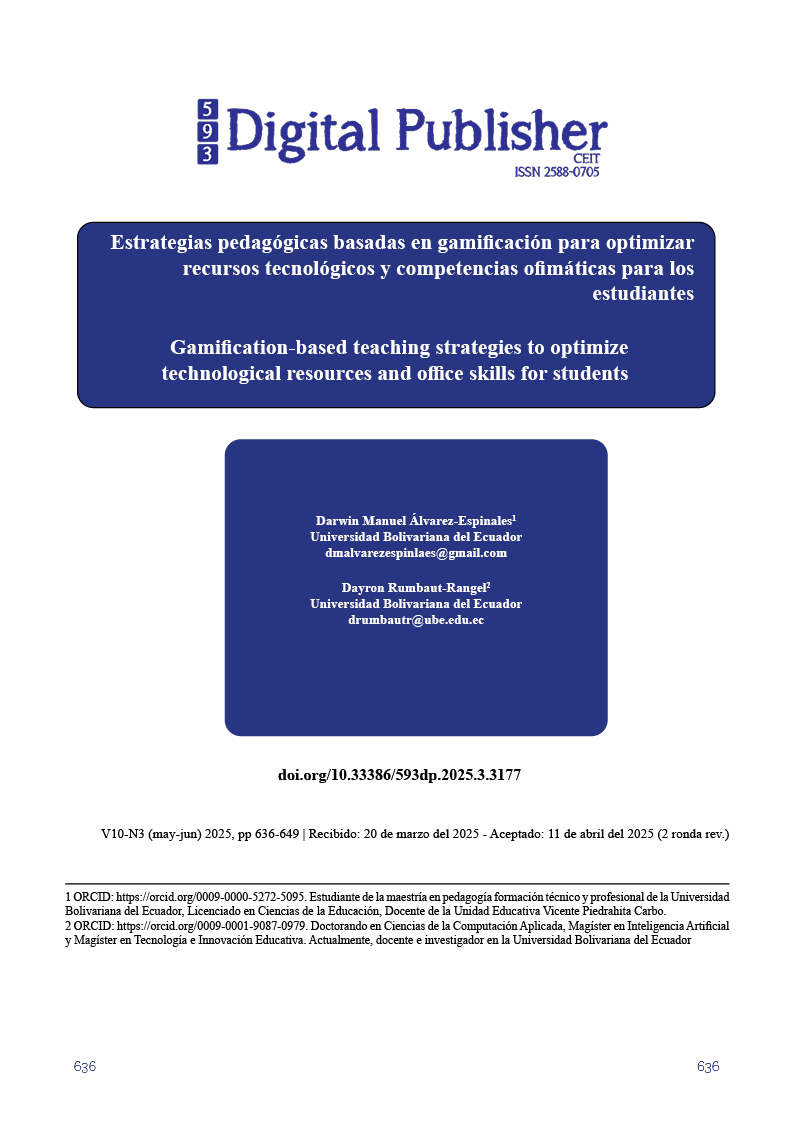Gamification-based teaching strategies to optimize technological resources and office skills for students
Main Article Content
Abstract
This research aims to analyze the impact of innovative pedagogical strategies for the development of digital skills in the technical bachelor’s degree in computer science, within the context of an Ecuadorian tax college. The study based on a technical education, starts from the need to overcome traditional practices, integrate current technological tools and promote the practical application of computer skills. Through a methodological proposal that incorporates active methods such as the flipped classroom, project-based learning and mainly gamification in order to adapt to current needs. This is intended to enhance learning and student autonomy. This intervention is expected to help close digital skills gaps, strengthen the link between theory and practice, and promote contextualized and sustainable teaching, achieving educational innovation. The present proposal offers a viable alternative to the structural limitations of the public education system, while promoting a didactic transformation geared to the challenges of the 21st century.
Downloads
Article Details

This work is licensed under a Creative Commons Attribution-NonCommercial-ShareAlike 4.0 International License.
1. Derechos de autor
Las obras que se publican en 593 Digital Publisher CEIT están sujetas a los siguientes términos:
1.1. 593 Digital Publisher CEIT, conserva los derechos patrimoniales (copyright) de las obras publicadas, favorece y permite la reutilización de las mismas bajo la licencia Licencia Creative Commons 4.0 de Reconocimiento-NoComercial-CompartirIgual 4.0, por lo cual se pueden copiar, usar, difundir, transmitir y exponer públicamente, siempre que:
1.1.a. Se cite la autoría y fuente original de su publicación (revista, editorial, URL).
1.1.b. No se usen para fines comerciales u onerosos.
1.1.c. Se mencione la existencia y especificaciones de esta licencia de uso.
References
Area, M., & Pessoa, T. (2012). De lo sólido a lo líquido: Las nuevas alfabetizaciones ante los cambios culturales de la Web 2.0. Comunicar: Revista científica de comunicación y educación, 19(38), 13–20. https://doi.org/10.3916/C38-2012-02-01
Boelens, R., Voet, M., & De Wever, B. (2018). The design of blended learning in response to student diversity in higher education: Instructors’ views and use of differentiated instruction in blended learning. Computers & Education, 120, 197–212. https://doi.org/10.1016/j.compedu.2018.02.009
Cobo, C. (2016). La innovación pendiente: Reflexiones (y propuestas) sobre educación, tecnología y conocimiento. Editorial Ariel.
Brigham, T. J. (2015). An introduction to gamification: Adding game elements for engagement. Medical Reference Services Quarterly, 34(4), 471-480. https://doi.org/10.1080/02763869.2015.1082385
Deterding, S., Dixon, D., Khaled, R., & Nacke, L. (2011). From game design elements to gamefulness. ACM Digital Library, 9-15. https://doi.org/10.1145/2181037.2181040
Liu, D., Santhanam, R., & Webster, J. (2017). Toward meaningful engagement: A framework for design and research of gamified information systems. MIS Quarterly, 41(4), 1011-1034.
Lister, M. (2015). Gamification: The effect on student motivation and performance at the post-secondary level. Issues and Trends in Educational Technology, 3(2), 1-22.
Moreno-Guerrero, A. J., Rodríguez-Jiménez, C., Ramos Navas-Parejo, M., & Soler Costa, R. (2020). Gamification in education: Breakout as an innovative method in primary education. Education Sciences, 10(1), 26. https://doi.org/10.3390/educsci10010026
Prensky, M. (2001). Digital natives, digital immigrants. On the Horizon: The International Journal of Learning Futures, 9(5), 1-6. https://doi.org/10.1108/10748120110424816
Redecker, C. (2017). European framework for the digital competence of educators: DigCompEdu. Publications Office of the European Union. https://doi.org/10.2760/159770
Selwyn, N. (2011). Education and technology: Key issues and debates. A&C Black.
Sobota, B., Pietriková, E., Parapanos, D., Ahmad, M., Wang, H., Tsai, C., & Sun, C. (2023). Computer science for game development and game development for computer science. En IntechOpen eBooks. https://doi.org/10.5772/intechopen.1000364
Voogt, J., & Roblin, N. P. (2012). A comparative analysis of international frameworks for 21st century competences: Implications for national curriculum policies. Journal of Curriculum Studies, 44(3), 299–321. https://doi.org/10.1080/00220272.2012.668938



